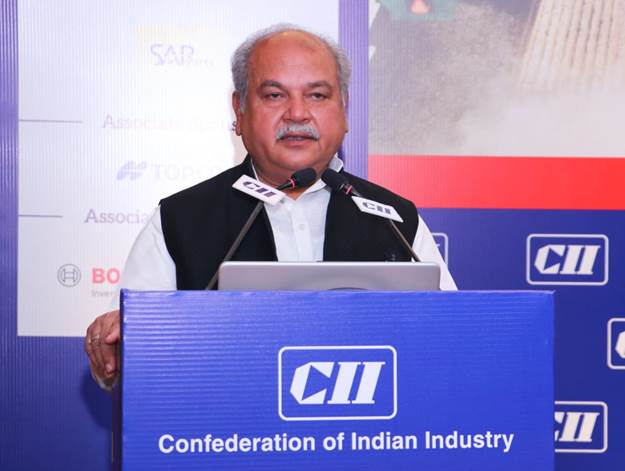The Summit on Farm Machinery Technology was recently inaugurated by the Union Minister of Agriculture and Farmers Welfare, Shri Narendra Singh Tomar. The event was organized by the Confederation of Indian Industry (CII) and Tractor and Mechanization Association (TMA).
In his speech, Shri Tomar emphasized the importance of providing small farmers in the country with the benefits of technology and machinery. He also stated that the government, under the leadership of Prime Minister Shri Narendra Modi, has been consistently working towards this goal. Since 2014-15, the government has released Rs.6120.85 crore to the states for various activities like training, testing, setting up of CHCs, hi-tech hubs and Farm Machinery Banks (FMBs) under the Sub-Mission on Agricultural Mechanization (SMAM). In addition, over 15.24 lakh farm machinery and equipment, including tractors, power tillers, and automated machinery, have been distributed at subsidized rates through state governments.
Shri Tomar further mentioned that the implementation of the new system at the Central Farm Machinery Training and Testing Institute (CFMTTI), Budni (M.P.), has reduced the time taken for completing the testing of tractors to a maximum of 75 working days. The Central Government has trained 1.64 lakh workers through its four FMTTI designated authorized test centers since 2014-15. The introduction of the Rupees One lakh crore Agricultural Infrastructure Fund and the approval of projects worth Rs.14,000 crore are also significant steps in this direction.
Moreover, the government is promoting Kisan drones and providing subsidies to various sections, including farmers, SC-ST category, and women farmers. Crop-specific SOP has also been issued for application of pesticides with drones. Shri Tomar emphasized that agriculture is a priority for the country, and we need to prepare a roadmap keeping in view the requirement of the population that will increase by 2050. He also emphasized the importance of increasing the production of food grains even if the land is less and making waste lands cultivable.
The government is working towards increasing farmers’ access to the market through e-NAM mandis and filling gaps in the agriculture sector with over Rs 1.5 lakh crore earmarked for Agriculture and Allied sectors.
